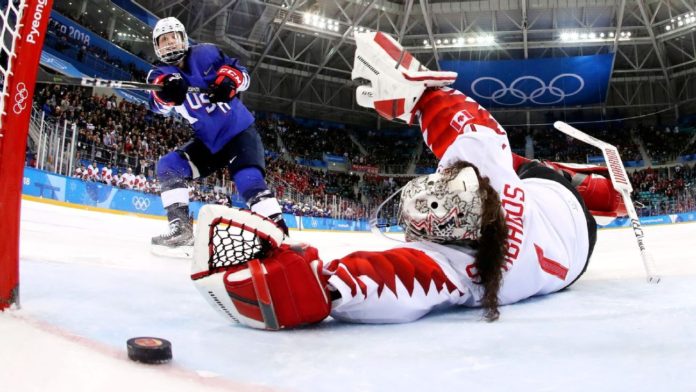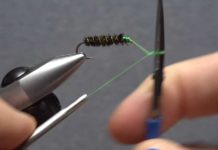Jocelyne Lamoureux-Davidson’s winning shootout goal in the 2018 Olympic women’s hockey gold-medal game — using the move she and her coach dubbed Oops, I Did It Again, a nod to Britney Spears — was one of the most iconic moments in U.S. women’s hockey history, helping the American women win their first Olympic gold in 20 years. (Lamoureux-Davidson’s twin, Monique Lamoureux-Morando, scored the tying goal in the third period.)
The game, against fierce rival Canada, was epic. Even celebrities such as Lil Wayne and Steph Curry tweeted about it. With 2.89 million viewers alone on NBC Sports Network, the game was the network’s most-watched show ever in the 11 p.m.-2:15 a.m. ET time slot. Upon returning home, the Americans embarked on a media tour, hoping to inspire the next generation of girls to dream bigger in hockey.
Here is an oral history on the significance of that moment.
Peter Elander, former assistant coach at University of North Dakota: I first began working with the twins in the fall of 2010. They were pretty raw. Very high competitive level, and they played tough. Technically, they were not really that talented, but they are really good at working on the technical aspect.
Angela Ruggiero, Hockey Hall of Famer, former U.S. women’s national team player: Those two are my little sisters. I saw so much of myself in them in some ways. When they made that team, they expected to be on the power play. When Mark Johnson didn’t put them out there, they were like pouting on the bench, furious. They were pissed they weren’t playing. They didn’t have a bad attitude, they were just young, and didn’t know how to hide it. But I saw a desire to make an impact, right out the gate. They were never just content. They always wanted to be better.
Elander: At the end of their first year [at UND], they had to get ready to go to worlds, but our season was over. So we did a lot of individual skates at Ralph Engelstad Arena. We put out three, four tires and went from one goal to the other. We’d do tai chi speed first. Then we’d increase the speed. They were not good at it, honestly. They had to work for every bit of control they have.
Lamoureux-Davidson: Peter had names for everything. One was called Fly Fishing. Oops, I Did It Again. He named moves after players too; the [Erik] Karlsson, the [Matt] Duchene. Moves we did around tires probably thousands of times. I probably failed equally as many times as I perfected it.
Elander: Normally, when you coach players and they can’t do things, they get tired, and they escape the hardship of trying. What the Lamoureuxes had in their mind was if they couldn’t do anything, they wanted to show you that they could learn it.
Hilary Knight, Team USA forward: They’re the do-or-die homies you want there. Once we got into a fight in Grand Forks, fittingly, against Canada and you couldn’t think of a better teammate you’d want on the ice with you.
After losing in overtime in the 2014 Olympic finals to rival Canada — the Canadians’ fourth straight Olympic gold — the two sides met again in the 2018 finals in Pyeongchang.
Julie Foudy, former U.S. women’s soccer captain and ESPN reporter at 2018 Olympics: Losing in 2014 was just crushing to that team. I really felt for them, I could see how much it affected them. I knew how badly they wanted to win, to get the opportunity again on that stage, but I didn’t know if the Lamoureuxes would have the chance. … The twins were such an important part of that team … pushing for equality in their fight with USA Hockey [in 2017], making sure maternity leave was included in the contract. They wanted to leave the program in a better place than they found it.
Knight: As teammates, they were just resilient. There was a point in time, and I don’t even know if I should be sharing this, to be honest, but I didn’t know if they would make the Olympic team in 2018. Their talents weren’t being showcased the way we all saw them showcased, and obviously the way everyone in the world saw them showcased in 2018.
Cassie Campbell-Pascall, former Canadian women’s hockey captain, CBC broadcaster: They weren’t going to make the team that year, that was the sense that I was getting.
Elander: I think that was a tough year for them mentally, coachingwise. I don’t think they got what they deserved early in the year.
Maddie Rooney, Team USA goaltender: The gold-medal game, it was definitely back-and-forth the entire game. Obviously any time we play Canada, it’s always intense and physical. But with an Olympic gold medal on the line, it was even more heightened than normal.
Campbell-Pascall: The Lamoureuxes were the two best American players in that game — and not just because they scored. They were all over the place, making things happen. You could tell, they were on a mission to will their team to win.
Marie-Philip Poulin, Team Canada captain: When you step on the ice and you get to play against them, you can tell right away they want to win. They’ll do anything in their power to do it. It’s tough to play against them, but over the years there’s been mutual respect. The one thing I value is how hard they compete.
Rooney: The Lamoureuxes are always physical. They were probably in the box that game — they’re always in the box — but they came out, and they were the heroes of the game for us.
With less than seven minutes remaining in the game, Canada clung to a 2-1 lead. Lamoureux-Morando scored on a breakaway.
Poulin: Of course I remember that next goal. I remember it well. Monique got a nice pass, we had a bad change, she went in on the breakaway.
Campbell-Pascall: If it’s on one of their sticks and they have so much time, it’s going to be in the back of the net.
Poulin: That was a key moment when they tied it up. And a tough moment for us, when we thought we had the momentum.
Campbell-Pascall: From a Canadian perspective, it was just 12 seconds. A poor dump-in, a poor change, it was just a 12-second letdown, if you will.
After a 20-minute four-on-four overtime, with both teams getting high-quality chances, the game went into the shootout.
AJ Mleczko, former U.S. national team player, NBC Sports broadcaster: I was so nervous because of what had happened four years earlier. Both in Sochi in Pyeongchang, I felt like the U.S. was the stronger team. Because it was a tie game, then we went into overtime, then we get to penalties. I see Poulin come on the ice, and I’m like, you’ve got to be kidding me. Poulin is going to be the killer again.
Poulin: We were all pretty stressed, when it comes down to a do-or-die situation like the shootout.
Foudy: There was much talent on display.
Mleczko: It’s not like the NHL, where they do shootouts all the time, where you have a memory bank of who is good, who has had success against whom. They didn’t do shootouts on the international women’s side regularly.
Lamoureux-Morando: The move that [Canadian] Melodie Daoust pulled off, I mean, that was ridiculous.
Mleczko: Daoust did the Forsberg! And Peter Forsberg was sitting two booths over from me. I was like, this is crazy. All of us in the broadcast booth looked over at him when he did it.
Lamoureux-Davidson: Everyone that had gone before me came right down the middle at a pretty similar pace, I think Amanda [Kessel] was the only one that really slowed it up. So I wanted to change up the pace; even though I came down the middle, I took a winding road to get there.
Knight: You just knew Joc was going to do something crazy, because she always does something crazy in practice. We hadn’t been practicing shootout all year, but we did practice the day before, ironically.
If you needed a better look at how DIRTY Jocelyne Lamoureux-Davidson’s game winning goal was 😱 https://t.co/wkOWa0qwZl pic.twitter.com/7GRRCOkoNk
— #TokyoOlympics (@NBCOlympics) February 22, 2018
Lamoureux-Morando: She had this look of confidence in her eyes. She wasn’t smiling, but she wasn’t frowning. There was just this stoic, confident look. She went and gave Maddie Rooney a pound before she approached the center of the ice.
Lamoureux-Davidson: All I was focused on was selling the first fake.
T.J. Oshie, Washington Capitals forward, who scored on four of six opportunities in a 2014 Olympic shootout against Russia: She looked like she was in the same mindset that I was when I was shooting [in the 2014 Olympics]. Everything else is blocked out, and you’re just going in, going to do your best move, and you’re focused on scoring a goal. Everything else fades into the background. The last thing I was thinking about was everyone watching back home, or what stage I was on.
Knight: That fake that she did to get Shannon [Szabados, Team Canada’s goaltender] to bite, that was picturesque. On the bench, it was a combination of excitement, awe and like, oh my goodness, it’s happening.
Campbell-Pascall: I was like, holy smokes. The audacity — in that pressure of a situation — to pull off that move? I learned after that she does it all the time, so it was like no big deal. But at the moment, I remember thinking, holy smokes, nerves of steel. And to do it on Shannon Szabados, the best goalie in the world.
Lamoureux-Davidson: Then obviously I had a pretty good backhand fake, and it was a wide-open net.
Poulin: You have to be pretty talented to do those moves, and obviously for her to pull it out in a gold-medal game, in an Olympic final, it’s pretty amazing.
Elander: I don’t know how some artists or singers or athletes can get everything in sync in that pressured moment. It’s amazing to me.
Oshie: It was amazing. That would have worked on an NHL goalie, no question. Her fake and the sell of the backhand, then her patience going to the forehand, it was pretty perfect. That’s not an elementary shootout move, and she pulled it off to perfection.
Lamoureux-Morando: The stakes were so high. Not every player wants to be in that pressure situation. But with her confidence, I knew she was going to score. But for her to pull off that move, pretty flawlessly? I mean, we’re twins, so it kind of feels like I scored, too.
Elander: I was so proud because she did something that day that she couldn’t do eight years before.
Mleczko: I can still picture her celebration perfectly. It must have been such a thrill but also such a relief. Because she’s trying something a little out of the ordinary. If you try something like that and it doesn’t work, it looks more foolish than if you don’t try anything new and it doesn’t work.
Knight: You grow up and you want to be part of those big moments and you want to represent her country because that’s the pinnacle in our sport. And then you win, and you understand how important it is to other people who are along the journey with you. So it just kind of came full circle in a Disney sort of way, that storybook ending that we’ve always been searching for for 20 years now.
Ruggiero: They didn’t celebrate like they won the gold medal, which I liked. Because they knew they hadn’t won. It was a big goal, but it wasn’t over.
Knight: On the bench, I think it was [Brianna] Decker, who said to Maddie: “One more!”
Rooney: At that moment, I was just feeding off the energy of the bench. I couldn’t imagine what they were going through, because they couldn’t control anything. It was literally down to just me.
Ruggiero: By the Rooney save, I lost my s—. Of course, I was standing next to the president of the Canadian Olympic committee. But I still cheered. I didn’t care.
Poulin: There’s a lot of mixed feelings, obviously, for us. But that was a great game for women’s hockey in general.
Ruggiero: In eight years as an IOC member, this is my favorite moment. I was supposed to give the medal out in Sochi, but I had to come back early because I was in business school at the time and my professor was going to kill me. But thank god, because then I was going to have to give Canada their gold medals. In overtime [in 2018], they needed me to walk somewhere to be in a prep area. So I watching f—ing overtime from a tiny screen. So I left. I was behind Maddie Rooney. If you look at the replay, you can see me pounding on the glass.
Knight: We were all celebrating after the game with our friends and family and our coaching staff. And somebody came up to one of our coaches and was like, “Aren’t you glad you didn’t cut the twins?”
Lamoureux-Morando: What’s so meaningful about how good our game was — it wasn’t just good for the women’s game. It was a good hockey game to watch.
Lamoureux-Davidson: As some of our teammates like to say, America likes winners. We had two silver medals, but when we came home with a gold, it was a whirlwind. We were America’s team. We were at multiple NHL venues, traveling across the country, hearing so many people tell us how they let their kids stay up late to watch, how they went into work the next day late because they stayed up to the middle of the night watching our game.
Lamoureux-Morando: There are going to be young girls who remember watching that game who are going to be inspired to play in the Olympics. One day, in 20 years or whatever it is, there are going to be girls on the Olympic team who remember watching that game. It’s pretty special to think about.
Credit: Source link





























